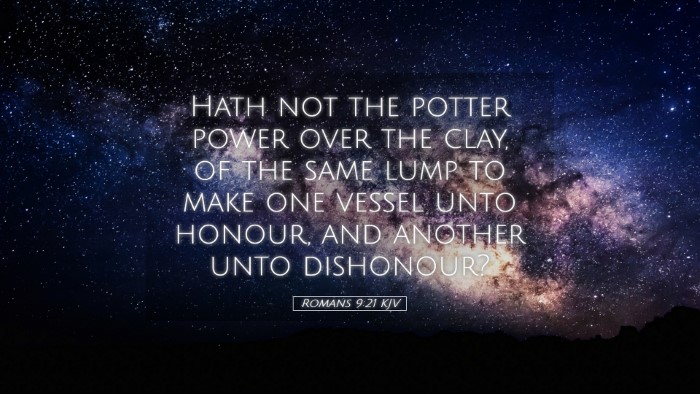Commentary on Romans 9:21
Verse: "Hath not the potter power over the clay, of the same lump to make one vessel unto honour, and another unto dishonour?"
Introduction
The verse Romans 9:21 encapsulates a profound theological assertion about God's sovereignty in His creative order and His divine purposes in shaping humanity. The Apostle Paul employs the metaphor of the potter and the clay to illustrate God's authority over His creation. This imagery is deeply rooted in the Old Testament, particularly in the prophetic works of Isaiah and Jeremiah. The following commentary synthesizes insights from several public domain authorities, providing a comprehensive exploration of this significant passage.
The Authority of the Potter
Paul opens this discussion by asserting the inherent authority of the potter over the clay. Matthew Henry emphasizes that the potter has absolute control over the clay, shaping it according to his will. This notion serves to remind both the reader and the believer that God, as the Creator, possesses the sovereign right to mold and direct His creations:
- Divine Sovereignty: God has the prerogative to exemplify mercy or judgment based on His divine wisdom (Henry).
- Creation and Purpose: Each creation is made for a specific purpose that aligns with God's overarching plan (Barnes).
Lessons from the Clay
Adam Clarke provides an insightful examination of the role of the clay itself. While the clay is passive, it is not without value. The different vessels fashioned from the same lump of clay illustrate the varied purposes and destinies in humanity:
- Unity in Diversity: The idea that from the same 'lump' of clay, God creates both honorable and dishonorable vessels conveys a profound truth about human existence and diversity (Clarke).
- Intrinsic Value: The clay, despite being shaped for different uses, retains its worth as part of the Creator's design (Henry).
Honour and Dishonour
Paul's reference to vessels of honor and dishonor invites rigorous theological reflection. Barnes articulates that God's choices in whom He honors and whom He does not is not arbitrary but is reflective of His righteous character:
- God's Purpose: Honour and dishonour serve God's purposes. He uses both for the fulfillment of His divine plan (Barnes).
- Mystery of Divine Will: While humans may struggle to comprehend the reasons for God's distinctions, trusting His wisdom is essential for believers (Clarke).
Theological Implications
There are several theological principles that emerge from Romans 9:21 that are relevant for pastors and scholars alike:
- Sovereignty of God: This verse underscores the doctrine of divine sovereignty, asserting that God is an active participant in the narrative of human history and individual destinies (Henry).
- Human Responsibility: While God exercises sovereignty, this does not nullify human responsibility. God's justice in dealing with humans is tempered by His mercy (Barnes).
- The Nature of Grace: God's grace is highlighted in His selection and purpose for individuals. Understanding the depth of divine grace can inspire greater humility and appreciation in the believer's life (Clarke).
Conclusion
Romans 9:21 serves as a powerful reminder of the divine order and purpose that exists within creation. The metaphor of the potter and the clay vividly illustrates the relationship between Almighty God and humanity. For pastors, theologians, and students, this verse invites deeper contemplation of God's sovereignty, mercy, and the varied purposes He has for each individual. The insights gleaned from traditional commentaries enrich our understanding and encourage us to engage in diligent study, seeking to grapple with the profound truths that reside within Scripture.


